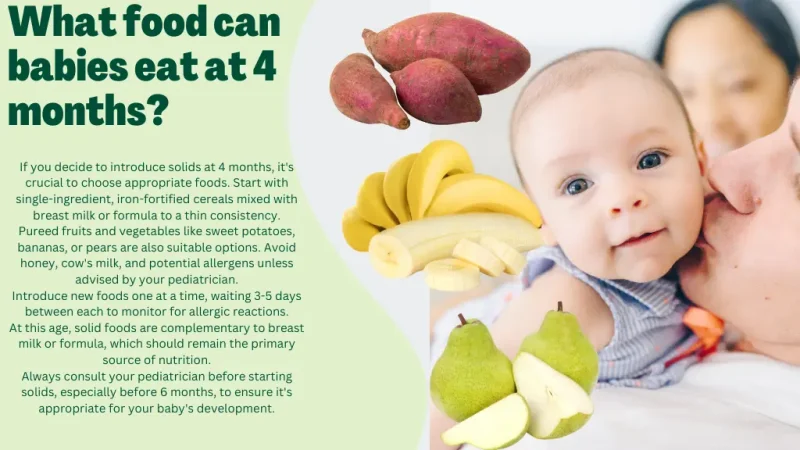As a new parent, you may be wondering, “Can I give my 4 month old baby food?” This is a common question that many parents face as their young children grow.
It is generally recommended to wait until 6 months of age before introducing solid foods. It is not recommended to start before 4 months. Some babies may show signs of readiness a little earlier, while others may take longer.
In this article, we’ll explore things to consider when deciding whether to introduce solids to your 4-month-old baby.

Signs of readiness:
While every baby develops at their own pace, there are several key indicators that your 4-month-old might be ready to start exploring solid foods:
- Head control: Your baby should be able to hold their head steady and upright without support.
- Sitting ability: They should be able to sit with support or in a high chair with good stability.
- Loss of tongue-thrust reflex: The baby no longer automatically pushes food out of their mouth with their tongue.
- Interest in food: Your baby may show curiosity about what you’re eating, possibly reaching for your food or watching intently during mealtimes.
- Weight gain: Most babies are ready for solids when they’ve doubled their birth weight and weigh at least 13 pounds (5.9 kg).
- Increased appetite: Your baby may seem unsatisfied after full milk feedings, possibly indicating they’re ready for more substantial nutrition.
- Ability to move food to the back of the mouth: This skill is crucial for swallowing solid foods safely.
- Hand-to-mouth coordination: Your baby can bring objects to their mouth, which is important for self-feeding.
Important note: While these signs can indicate readiness, it’s crucial to remember that the American Academy of Pediatrics recommends exclusive breastfeeding or formula feeding for the first six months.
Always consult with your pediatrician before introducing solid foods, especially if you are considering doing so before six months of age.
Potential risks of early introduction:
While some parents may be eager to start their baby on solid foods, introducing solids before 4-6 months can pose several risks:
- Digestive system immaturity: A 4-month-old’s digestive system may not be fully developed to handle solid foods. This can lead to:
- Increased risk of gastrointestinal issues
- Potential for food allergies
- Difficulty digesting certain nutrients
- Choking hazards: Younger babies may not have developed the necessary oral motor skills to safely swallow solid foods, increasing the risk of choking.
- Interference with breast milk or formula intake: Solid foods may replace important calories and nutrients from breast milk or formula, which should be the primary source of nutrition at this age.
- Potential for overfeeding: Early introduction might lead to overfeeding or rapid weight gain, which has been associated with obesity later in life.
- Increased risk of food allergies: Some studies suggest that introducing certain foods too early may increase the risk of developing food allergies.
- Kidney strain: A young baby’s kidneys may not be mature enough to handle the increased solute load from solid foods, potentially causing strain.
- Iron deficiency: Introducing solids too early might interfere with iron absorption from breast milk, potentially leading to iron deficiency.
- Celiac disease risk: For babies with a genetic predisposition, introducing gluten-containing foods before four months may increase the risk of developing celiac disease.
Important note: While these risks exist, it’s crucial to remember that every baby is unique. Always consult with your pediatrician before making decisions about introducing solid foods, especially if you are considering doing so before the recommended six months of age.
Remember, the World Health Organization (WHO) and many health authorities recommend exclusive breastfeeding for the first six months of life, with complementary foods introduced after that while continuing breastfeeding.
The Pros and Cons of Starting Solids at 4 Months
While the general recommendation is to wait until six months, some parents consider introducing solids at four months.
Here’s a balanced look at the potential advantages and disadvantages:
Pros:
- Potential iron boost: Some babies may benefit from the additional iron in solid foods, especially if they’re at risk for iron deficiency.
- Developmental opportunity: Early introduction might provide an additional avenue for sensory exploration and motor skill development.
- Allergen exposure: Some research suggests that early introduction of allergenic foods might help reduce the risk of developing certain food allergies.
- Potentially improved sleep: Some parents report that babies who start solids early sleep for longer stretches, though scientific evidence is mixed.
- Cultural practices: In some cultures, earlier introduction of solids is traditional and may have social or familial benefits.
Cons:
- Digestive system immaturity: A 4-month-old’s gut may not be fully ready to process solids, potentially leading to digestive discomfort or issues.
- Choking risk: Younger babies may lack the necessary oral motor skills to manage solid foods safely.
- Reduced breast milk or formula intake: Solids might replace essential nutrients from milk, which should be the primary source of nutrition at this age.
- Increased allergy risk: Some studies suggest that introducing certain foods too early may increase the likelihood of developing allergies.
- Kidney strain: A young baby’s kidneys may not be mature enough to handle the increased solute load from solid foods.
- Potential overfeeding: Early introduction might lead to overfeeding or rapid weight gain, which has been associated with later obesity.
- Loss of protective effects: Exclusive breastfeeding for six months provides optimal immunity and nutritional benefits, which may be compromised by early solid introduction.
Important considerations:
- Every baby develops at their own pace. Always consult with your pediatrician before introducing solids, especially before six months.
- If you do decide to start at four months, begin with small amounts of single-ingredient, iron-rich foods.
- Continue with breast milk or formula as the primary source of nutrition throughout the first year.
- Watch for signs of readiness in your baby, such as good head control and loss of the tongue-thrust reflex.
- Remember that the World Health Organization and many health authorities recommend exclusive breastfeeding for the first six months of life.
Ultimately, the decision to introduce solids should be made in consultation with your healthcare provider, taking into account your baby’s individual needs and development.
What food can babies eat at 4 months?

If you decide to introduce solids at four months, it’s crucial to choose appropriate foods. Start with single-ingredient, iron-fortified cereals mixed with breast milk or formula to a thin consistency.
Pureed fruits and vegetables like sweet potatoes, bananas, or pears are also suitable options. Avoid honey, cow’s milk, and potential allergens unless advised by your pediatrician.
Introduce new foods one at a time, waiting 3-5 days between each to monitor for allergic reactions.
At this age, solid foods are complementary to breast milk or formula, which should remain the primary source of nutrition.
Always consult your pediatrician before starting solids, especially before six months, to ensure it’s appropriate for your baby’s development.
If You Decide to Start: A Step-by-Step Guide
If you’ve consulted with your pediatrician and decided to introduce solids at four months, follow these steps:
Step 1: Prepare the environment
Create a calm, supportive feeding environment. Ensure your baby is seated upright in a high chair or supported seat. Have all necessary items ready, including a soft-tipped spoon, bib, and a damp cloth for clean-up.
Step 2: Choose the right food
Start with a single-ingredient, iron-fortified cereal mixed with breast milk or formula. Rice cereal is a common first food, but oat or barley cereals are also options. Mix it to a thin, runny consistency.
Step 3: Timing is key
Offer solids when your baby is alert and slightly hungry but not overly hungry or tired. Mid-morning often works well. Start with a small amount, about 1-2 teaspoons.
Step 4: Introduce the food
Place a small amount of food on the tip of a soft spoon. Gently touch your baby’s lips to let them taste it. Don’t force the spoon into their mouth – let them open up and accept it willingly.
Step 5: Watch for cues
Pay attention to your baby’s reactions. They might push the food out with their tongue at first – this is normal. If they turn away or seem uninterested, don’t force it. Try again another day.
Step 6: Gradual increase
If your baby seems interested, slowly increase the amount over several feedings and days. Aim for about 1-2 tablespoons per feeding by the end of the first week.
Step 7: Introducing new foods
After success with cereal, introduce single-ingredient pureed fruits or vegetables. Wait 3-5 days between new foods to watch for any allergic reactions.
Step 8: Maintain milk feeds
Remember, solid foods at this age are complementary to breast milk or formula. Continue regular milk feeds as before.
Step 9: Monitor and adjust
Keep track of your baby’s reactions, digestion, and overall health. If you notice any concerning symptoms, contact your pediatrician immediately.
Step 10: Be patient and flexible
Every baby is different. Some may take to solids quickly, while others may need more time. Be patient and follow your baby’s lead.
Starting solids at four months is a personal decision that should be made in consultation with your pediatrician. Always prioritize your baby’s individual needs and development.
Potential Allergies and Reactions:
| Common Allergens | Possible Reactions | When to Introduce | Precautions |
| Milk | Hives, vomiting, wheezing | After 1 year (as a drink) | Introduce dairy in other forms earlier if advised by pediatrician |
| Eggs | Skin rash, digestive issues | 4-6 months | Start with well-cooked egg yolk |
| Peanuts | Swelling, difficulty breathing | 4-6 months | Consult a pediatrician, especially if there is a family history of allergies |
| Tree nuts | Anaphylaxis, itching | 4-6 months | Introduce one type at a time |
| Fish | Hives, swelling | 4-6 months | Start with low-mercury options |
| Shellfish | Throat tightness, vomiting | 4-6 months | Introduce one type at a time |
| Soy | Skin reactions, digestive upset | 4-6 months | Often found in infant formulas |
| Wheat | Eczema, digestive issues | 4-6 months | Start with other grains first |
Important notes:
- Always introduce new foods one at a time, waiting 3-5 days between each new food.
- Start with small amounts to minimize potential reactions.
- Watch for signs of allergic reactions, including rash, hives, vomiting, or difficulty breathing.
- If there’s a family history of food allergies, consult your pediatrician before introducing common allergens.
- In case of a severe reaction, seek immediate medical attention.
- Recent research suggests early introduction of allergenic foods may help prevent allergies, but always consult your pediatrician first.
- Keep a food diary to track new introductions and any potential reactions.
Is 4 months too early to start baby food?
While some babies may show signs of readiness at 4 months, most health organizations recommend waiting until 6 months before introducing solid foods.
At 4 months, a baby’s digestive system is still developing, and they’re typically not yet able to sit upright or control their head movements adequately.
Introducing solids too early may increase the risk of choking, allergies, and digestive issues. Additionally, breast milk or formula provides all the necessary nutrients at this stage. However, every baby is unique, and some may be ready slightly earlier.
It’s crucial to consult with your pediatrician before making any decisions about starting solid foods, as they can assess your baby’s individual development and needs.
Is it safe to give a 4-month-old solid?
The safety of introducing solids to a 4-month-old is a topic of debate among healthcare professionals.
While some babies may show signs of readiness at this age, most health organizations, including the World Health Organization and American Academy of Pediatrics, recommend waiting until 6 months for optimal health benefits.
The primary concerns for early introduction include increased risk of choking, potential digestive system immaturity, and possible interference with important nutrients from breast milk or formula.
However, every baby is unique, and in some cases, a pediatrician might recommend starting solids earlier.
It’s crucial to consult with your child’s healthcare provider before making this decision, as they can assess your baby’s individual development and needs.
Conclusion:
The decision to introduce solid foods to your 4-month-old baby is a personal choice that should be made in consultation with your pediatrician.
While some babies may show signs of readiness at this age, it’s important to weigh the potential benefits against the risks. Remember that breast milk or formula should remain the primary source of nutrition for the first year of life.
Ultimately, every baby is unique, and what works for one may not be suitable for another. Pay attention to your baby’s cues, follow professional medical advice, and trust your instincts as a parent.
Whether you choose to start solids at four months or wait until six months, the key is to ensure your baby’s nutritional needs are met and to make the transition to solid foods a safe and positive experience for both you and your little one.

3 thoughts on “Can I give my 4 month old baby food? Essential Facts”